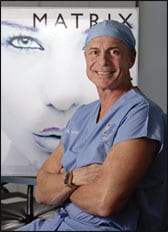 |
It’s an understatement to say that Joseph Niamtu III, DMD, is dedicated to his Richmond, Va-based cosmetic facial surgery practice.
One example of his commitment is his business card, which includes his personal cell phone number and e-mail address. If that seems like a lot of exposure to patients who may just need some hand-holding, that’s fine with Niamtu—they are worth having for those inevitable times when patients ask for explanation and reassurance.
After office hours, exercising, and some quality time with his wife and two special-needs kids, Niamtu is back to work on the computer until midnight, writing articles, blogging about new trends and techniques, or updating his practice Web site.
Given all this attention to his practice, it isn’t surprising that Niamtu has a loyal clientele. Why should plastic surgeons take note of this “renegade”—a board-certified oral and maxillofacial surgeon and a fellow of the American Academy of Cosmetic Surgery who is not also board-certified by the American Board of Plastic Surgeons?
Niamtu is an ambitious example of the crossover surgeon, the so-called multispecialist who has taken the field by storm. And if you think cosmetic surgeons such as Niamtu will never last, think again.
ALL ABOUT COSMETICS
Niamtu readily admits his origins as a maxillofacial—not a plastic—surgeon who limits his practice to cosmetic facial surgery. In fact, he is happy to educate his patients about the distinctions between all of the titles: plastic, cosmetic, and maxillofacial. However, he no longer treats patients for maxillofacial conditions or trauma. His sole interest is in cosmetic facial techniques, technologies, and products that, as he explains, make his patients look and feel good about themselves.
“No single specialty owns the face—or the body, for that matter. As long as [physicians] are doing safe and effective surgery with good outcomes, and have happy patients, then I just think it’s the new face of cosmetic surgery,” Niamtu says.
“Admittedly, some people are going to fight it and be against it, and other people are going to embrace it, but you can’t argue that it’s not here to stay,” he adds.
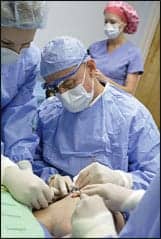 |
| Niamtu takes measurements prior to lip augmentation of a patient. |
Ask Niamtu about his training, and he will list his dental degree from Case Western Reserve University, his oral and maxillofacial surgical program and residency at Virginia Commonwealth University, a large number of continuing medical education courses (more than 200 hours in 2008) and academic presentations (more than 50 in 2008), and thousands of hours of procedure experience. Not to mention his 25 years of experience. Of that time, he has focused exclusively on cosmetic facial surgery for most of the past decade.
“As a board-certified oral and maxillofacial surgeon, I live in the head and neck,” he says. “I learned many of the cosmetic procedures I perform now in my residency training, but many of the contemporary procedures did not exist then. So I learned those techniques the same way that my plastic surgery colleagues, and dermatologic colleagues, and ENT [ear, nose, and throat] colleagues did, and that was by continuing medical education.”
Niamtu’s extensive training in facial trauma, facial reconstruction, and temporomandibular joint disorder surgery facilitated the transition to much less invasive soft-tissue cosmetic procedures, such as the endoscopic brow lift, facelift, and cosmetic eyelid surgery.
As for the argument of, “Who, then, is a cosmetic surgeon?” Niamtu states that a cosmetic surgeon is defined as “a surgeon that limits their practice to cosmetic surgery.” Sounds simple enough.
“Every practitioner has the obligation to offer his or her patients the latest advances in their specialty,” Niamtu says. “Many specialties have advanced to include a cosmetic curriculum. There are plastic surgeons who get excellent cosmetic training and some who are well-versed in many other skills but have little cosmetic experience. The same can be said about dermatology, ophthalmology, ENT, and oral and maxillofacial. So, it really boils down to your training, your experience, your outcomes, and the success of your practice.
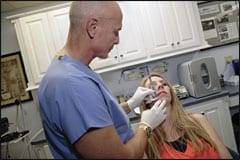 |
| To Niamtu, few cosmetic operations are as visible and have the impact of a facelift. |
“The indisputable fact is that there are numerous specialties that perform safe and effective cosmetic surgery. It is a contemporary fact of life.
“Cosmetic facial surgery is taught in the oral and maxillofacial surgery residency programs, it is part of our board exams, and it is covered by our malpractice,” he continues. “It is in no way a stretch for trained oral and maxillofacial surgeons to perform head and neck surgery, cosmetic or otherwise.”
TAKING CARE OF THE CLIENTS
Niamtu is the founder of a group practice with nine partners that focuses on routine oral and maxillofacial procedures at six locations throughout the greater Richmond area. He developed the group practice from his own single-practitioner days, and while there are many factors to his continued success—especially his partners—he says that having a successful practice boils down to treating the patients well, backing up your work, and being accessible.
Although Niamtu believes that beautiful office surroundings should be part of one’s marketing plan, treating patients well goes way beyond a designer waiting room.
For Niamtu, it is interpersonal communication that is perhaps most important. He creates an easy, conversational relationship with patients—for instance, they call him “Dr Joe”—and he gives every patient his direct cell phone number and e-mail address.
“Nothing upsets me more than when I have made an investment in some situation and I can’t get in touch with the people on the phone. In the same way, patients having access to me is important, especially if you want to be the best at what you do.”
On the other hand, Niamtu claims that patients rarely call him. “I’ve never been abused,” he says. “First of all, people are very apologetic when they call a doctor, and I always tell them, ‘Relax. If you can’t call your doctor, you’ve picked the wrong doctor.’ I look at it this way: I do several facelifts every week, but this patient may have one in their entire life, so if I’m too busy to give that patient 4 minutes, even if it’s just to reassure them, then I shouldn’t be doing this. Concierge care is nothing new. Good doctors have been offering it for years.”
In tune with this personal care philosophy, Niamtu is also one of those physicians who does all of the Botox and filler injections personally.
“I really think that doctors who aren’t doing their own injections are really missing the boat,” he notes. “It really doesn’t take but 2 minutes to do the injection, and it’s just excellent time spent with the patient. I do a little PR [public relations] and talk to them about other potential procedures, so I think it’s a huge marketing moment for a small investment of time. Besides that, I truly enjoy interacting with my patients, as they are one of the joys of my life.”
HANDS-ON MARKETING
As with his work, lectures, and continuing education, Niamtu says part of his success is due to his hands-on approach to all of his marketing and PR.
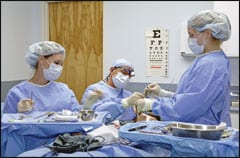 |
| Niamtu (center) and his staff are hard at work in his practice’s AAAHCaccredited surgery center. |
“Cosmetic surgery is one of those fields that’s strongly marketed,” he says, “and to maintain a presence in the ‘cosmosphere,’ if you will, you have to market in numerous ways. The Yellow Pages are pretty worthless at this point, so the Internet has become my number one marketing tool.”
Niamtu spends several hours per week personally updating his Web site with before-and-after photos, working on his lecture schedule, and educating current and prospective patients with his Web blog.
“Embracing technology is one of the most important things you can do today,” he says. “It amazes me when you still have doctors that don’t even have a Web site or just have a Yellow Pages Web site with just their picture and their hours. Patients have an insatiable thirst for knowledge, which is good and bad. Some get misinformation, so even before they come in, you can reeducate them.”
Niamtu also contributes to print, radio, and television campaigns, as well as direct mail, e-mail-based marketing blasts, and Web-based promotions. Each method of outreach speaks to a different audience, from the older, technology-averse Baby Boomers to the younger, tech-savvy generations.
MAINTAINING TECHNOLOGY FILTERS
Though Niamtu is a big proponent of cosmetic surgery innovations, he sees the onslaught of new aesthetic products as needing a filter.
“We’re in a period where I think we all have to have technology filters,” he explains. “For example, when endoscopic surgery, or tumescent liposuction, or CO2 and vascular lasers made their way onto the scene, they were all new technologies that worked and replaced previous technology. The problem now is that every week, there is some new laser or treatment, and I think that the marketing hype can outstrip the actual effectiveness of the product.”
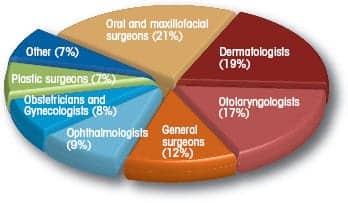 |
| Breakdown of Specialties The American Academy of Cosmetic Surgery (AACS) recently reported its members represent practitioners from a wide range of medical fields. |
Although he calls himself an early adopter, Niamtu takes time to evaluate products, and even when all signs look good, he takes his time implementing a new product in his practice, especially those that are featured on talk shows such as The Oprah Winfrey Show—products that clients ask about but need to be studied prior to getting rolled out.
“We’ve seen so many things like thread lifts and a multitude of skin-tightening lasers that really haven’t been able to uphold what they’ve advertised. One of the ways to negatively market your practice is to do a procedure on somebody and have no result.”
For Niamtu, the CO2 laser that he’s had for a decade is still his gold standard for skin rejuvenation, but he provides fractional laser-based procedures that can provide patients with faster recoveries. Making only one just option available to patients is not a good strategy, he notes.
No matter what tools he uses, Niamtu says, “You can hide mediocre surgical results on boobs, butts, and bellies, but you can’t hide the face. My work is my signature, and mediocre facial surgeons don’t stay in business long.”
Cosmetic facial surgery is not just a job to Niamtu—it is a passion, and, as he puts it, “he is totally immersed in it.” Also, he hits the lecture circuit in the United States and abroad—21 out of 52 weekends this year, he boasts. “Speaking in Athens, Maui, and Dubai is fun, but spending many hours in airports is a drag,” he says.
In addition to presenting five cosmetic courses at his surgery center—and training surgeons from all over the world—Niamtu has contributed more than 200 journal articles, textbook chapters, and general interest articles to the cosmetic literature.
|
See also “For the Good of the Patient” by Lesley Ranft in the December 2007 issue of PSP. |
“I find writing very relaxing and creative, and where some people find it a chore, I really enjoy it,” he says. “All good teachers are students as well.” He is a meeting co-chair for the American Academy of Cosmetic Surgery Annual Meeting, and he has also served on the board of directors of the Cosmetic Surgery Foundation.
As with so many physicians in the aesthetic medicine field, Niamtu gives back to the community—helping his patients financially and often performing pro bono work, both locally in Richmond and even outside the community. In addition, he donates his skills to battered women from local shelters, as well as patients with mental and physical disabilities.
He has also been honored with a community service award for his volunteer work with children from Haiti, the Dominican Republic, Jamaica, El Salvador, Bosnia, and other countries.
Tor Valenza is a staff writer for PSP. He can be reached at [email protected].




